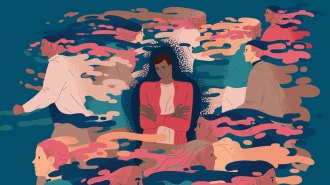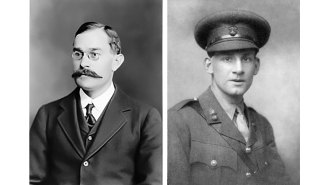Psychology
-
 Animals
AnimalsWhat parrots can teach us about human intelligence
By studying the brains and behaviors of parrots, scientists hope to learn more about how humanlike intelligence evolves.
-
 Science & Society
Science & SocietyMost people say self-control is the same as willpower. Researchers disagree
Psychologists say self-control is about planning ahead to avoid relying on willpower in the moment. Laypeople see things differently.
By Sujata Gupta -
 Psychology
PsychologyHere’s how to give a good gift, according to science
Gifting researcher Julian Givi outlines common mistakes gift givers make and how science can help us avoid those costly errors.
By Sujata Gupta -
 Psychology
PsychologyWhy scientists are expanding the definition of loneliness
Feeling detached from animals, places and routines can cause loneliness, researchers are learning, which may expand the list of interventions.
By Sujata Gupta -
 Psychology
PsychologyAn apology to Indigenous communities sparks a mental health rethink
The leading U.S. psychological association pledged to embrace Indigenous approaches to healing, which requires rethinking how to address mental health.
By Sujata Gupta -
 Psychology
PsychologyTime in nature or exercise is touted for happiness. But evidence is lacking
A review of hundreds of studies finds limited strong scientific evidence to support many common recommendations for leading a happier life.
-
 Psychology
Psychology‘Fires in the Dark’ illuminates how great healers ease mental suffering
Kay Redfield Jamison’s new book examines approaches used throughout history to restore troubled minds and broken spirits.
By Bruce Bower -
 Psychology
PsychologyBoys experience depression differently than girls. Here’s why that matters
Boys’ depression often manifests as anger or irritability, but teen mental health surveys tend to ask about hopelessness.
By Sujata Gupta -
 Humans
HumansRace car drivers tend to blink at the same places in each lap
Blinking is thought to occur randomly, but a new study tracking blinks in racing drivers shows it can be predictable — and strategic.
-
 Science & Society
Science & SocietyDeliberate ignorance is useful in certain circumstances, researchers say
The former East German secret police, the Stasi, spied on people for years. But when given access to the Stasi files, most people didn’t want to read them, researchers found.
By Sujata Gupta -
 Health & Medicine
Health & MedicinePets and people bonded during the pandemic. But owners were still stressed and lonely
People grew closer to their pets during the first two years of COVID. But pet ownership didn’t reduce stress or loneliness, survey data show.
-
 Psychology
PsychologyNative language might shape musical ability
People who speak tonal languages, where pitch alters meaning, are better at perceiving melody but worse at rhythm than speakers of nontonal languages.